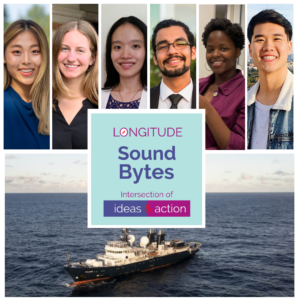
Longitude Sound Bytes
Ep 92: Deep Dive with SOI (Listen)
Jaena Kim
Welcome back to Longitude Sound Bytes, bringing innovative insights from around the world directly to you. You’re right on time for the romantic Valentine’s Day launch of our next Longitudes of Imagination series. I’m Jaena Kim, Longitude fellow and law student from the University of Ottawa.
Tony Zhou
I’m Tony Zhou, a Longitude fellow and data scientist at Yale University. The Schmidt Ocean Institute, or SOI, is a philanthropically funded non-profit foundation that enables scientific exploration at no cost to the world’s scientists. To date, the Institute’s research vessel (Falkor) has mapped over 1.25 million miles of the ocean floor, hosted more than 1,000 scientists on nearly 80 expeditions, and discovered countless new species and deep-sea bathymetry.
Jade McAdams
For this Valentine’s Day, we’re excited to share with you – our listeners – a special sneak peek of the Deep Dive with SOI series with members Carlie Wiener, Eric King, Jason Wiliams, Errol Campbell, Corinne Bassin, and Jyotika Virmani. I’m Longitude fellow Jade McAdams and a mechanical engineering student at Rice University.
Blake Moya
The United Nations has proclaimed a decade of ocean science for sustainable development, or UN Decade of Ocean Sciences, to support efforts to reverse the cycle of decline in ocean health and create improved conditions for sustainable development of the ocean. I’m Blake Moya, Longitude Fellow and a Statistics PhD student at the University of Texas at Austin.
Wendy Liu
SOI is contributing to a worldwide effort to map the entire ocean floor by 2030 through their oceanographic research vessel, Falkor – and soon to be – Falkor (too). I’m Wendy Liu, Longitude Fellow and alum of Rice University currently working in education technology.
Chinenye Oguejiofor
I’m Chinenye Oguejiofor, Longitude Fellow and global law student at Tilburg University. Discover the various roles of individuals, technologies, and research that help advance the understanding of our oceans through the profound work of organizations such as the Schmidt Ocean Institute.
Jade
Deep Dive with SOI is our second series on innovative ocean research! A big thanks to the shipmates of the Mayflower Autonomous Ship featured on the first Longitudes of Imagination, which is available for listening on our website and various podcast platforms. Working with the crew of the MAS400 inspired us to look further into possibilities in the realm of ocean research, and the Schmidt Ocean Institute gave us the chance to speak with a talented group of individuals, learn from them, and then share that knowledge with our listeners. Errol Campbell says a similar learning process has been key in his journey.
Errol Campbell
You’re always going to be working with people and learning from them. What we called back in the day, it was like journeyman, or tradesman, or whoever will take care of you for a certain period of time, during your mentoring procession, and then you move on, and you actually progress and become one of these mentors for the more junior people.
Chinenye
Despite the progression of knowledge among those who study the ocean, we still know more about space than our oceans right here on Earth. In contrast to space being completely silent, the ocean makes millions of indescribable sounds. Both deserve our undivided attention; we need to discover what we can, both the known unknowns and the unknown unknowns.
Corinne Bassin
Less than 20% of the ocean floor is currently mapped. It’s crazy to think about that when you look at how much we know about Mars.
Jaena
With members of the Schmidt Ocean Institute, we deeply explore global value creation that floats along with better understanding of our oceans. Dr. Wiener and I dive into the significance of the ocean’s role and potential in improving our everyday lives in the very next episode of Deep Dive with SOI.
Carlie Wiener
And in terms of how we use research for human prosperity, the options are endless. We’re looking to the deep sea now to look at how it can be a carbon sink in helping to address our climate change problem. A lot of these deep sea species and even things as small as microbes we don’t know a lot about, and their potential to help with human disease. And there are some examples of that. And so we are able to transform human society with the ocean. Supporting the exploration and understanding of it and protection of it is absolutely critical.
Blake
Though the technology, as fast as it’s evolving, may not be where ocean researchers are hoping it to be, that doesn’t mean it can’t pave the way for more creativity. Though necessity is the mother of invention, creativity is the mother of innovation– and already researchers at SOI are planning on how to use the tech available to them to push the limits of ocean science.
Jason Williams
There isn’t really that capability out there right now. And so the possibilities are endless. So I’m constantly thinking of different things to use that crane’s capabilities, like can we put down a whole ocean observatory?
Wendy
With that creativity also comes an open mind to new ways to conduct even methods of the past.
Eric King
There are certain ways that we think science should be conducted. There are certain ways that we think we should collect data. There’s certain ways that we think that we should process information. But that was how we thought about things yesterday, the day before. What we’re really most interested in is technology and how technology can surprise people in ways that we never could have imagined. But to do that, you have to open your mind, and we don’t talk about thinking outside of the box. We actually want to push to all corners of the box, we want to push beyond the corners of the box and expand the box really. To do that, though, is a bit of some retraining, perhaps, of the way that we’ve been doing business for the hundreds of years and even the way ocean sciences are taught today. And we’re seeing that happen already.
Tony
And a preview of the wondrous finds at the Schmidt Ocean Institute, which could reconceive our understanding of marine biology such as squid behavior. Jyotika and I discuss how essential it is to map the sea floor as a fundamental step towards improving our understanding of the ocean, and how advances in ocean robotics, data-sharing, and high-performance computing will create exciting new dimensions.
Jyotika Virmani
We stumbled across the largest sea creature, a siphonophore. It’s about 45 to 50 meters in length. And so that was a serendipitous finding. In October of 2020, we had another surprise discovery. We were doing some systematic mapping off the coast of Northeast Australia, so Coral Sea, Great Barrier Reef region, and we found a new coral reef. It’s like a 500 meter tall coral reef. It’s pretty tall. So that was a new discovery. The first time something like that has been discovered in about 120 years in that region. And then the same week, we caught the first sighting of what’s called a Ram’s Horn Squid, Spirula, which has never been seen in the wild before, in underwater.
Chinenye
This brings us to the end of our introductory episode.
Wendy
We can’t wait for you to deep dive into SOI with its incredible members, and us!
Blake
Follow Longitude on Facebook, Instagram and LinkedIn to make sure you don’t miss the continuation of Longitudes of Imagination in collaboration with the Schmidt Ocean Institute.
Jade
You can also visit our website at Longitude.Site, for more information and content.

